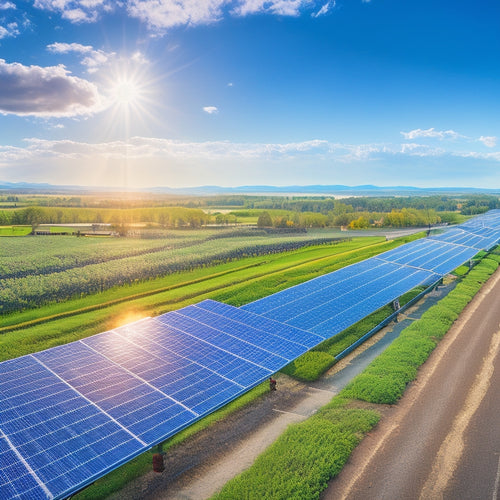
Commercial Solar Solutions for Business Benefits
Share
Commercial solar solutions offer you cost-effective energy savings and a path to greater sustainability. By switching to solar, you can cut your electricity bills by over 50%, thanks to financial incentives and tax credits that lower your upfront investment. These solutions reduce your reliance on fluctuating utility prices, giving you more control over energy expenses. Additionally, adopting solar aligns your business with eco-conscious values, enhancing your brand reputation. With the right system in place, you'll not only see immediate savings but also long-term returns on investment. Uncover how these advantages can benefit your business further.
At a Glance
- Commercial solar solutions can reduce electricity bills by over 50%, enhancing financial flexibility and long-term savings for businesses.
- Tax incentives and rebates significantly lower upfront costs, making solar installations more affordable and financially viable.
- Utilizing solar energy decreases reliance on fossil fuels, contributing to a reduced carbon footprint and promoting environmental sustainability.
- Investing in solar technology enhances energy resilience, minimizing operational disruptions during outages and peak demand periods.
- Choosing the right solar panel type and system components optimizes energy production and aligns with a business's sustainability goals.
Cost-Effective Energy Savings
Switching to commercial solar solutions can greatly lower your electricity bills, allowing you to redirect funds to other critical areas of your business.
By achieving energy bill reductions that can exceed 50%, your company can benefit from financial incentives and tax credits that make the initial investment even more attractive.
Plus, with various tax incentives and rebates available, the initial investment becomes even more attractive.
Reduced Electricity Bills
One of the most persuasive reasons to invest in commercial solar solutions is the potential for noticeably reduced electricity bills. By utilizing the sun's energy, you can greatly decrease your reliance on grid power, especially during peak demand hours when rates soar. Effective energy management through solar installations allows you to generate your own electricity, which equates to substantial savings over time.
Here's a simple breakdown of potential savings:
| Month | Traditional Bill | Solar Bill |
|---|---|---|
| January | $1,200 | $600 |
| June | $1,500 | $800 |
| December | $1,100 | $550 |
In this example, implementing solar technology can cut costs dramatically, giving you more financial freedom to invest in other areas of your business. You'll find that not only are you saving money, but you're also contributing to a sustainable future. By taking control of your energy expenses, you free yourself from fluctuating utility rates and can better predict your overall costs. Embracing solar energy is a step toward financial independence and resilience in a constantly changing energy environment.
Tax Incentives and Rebates
When considering commercial solar solutions, tax incentives and rebates can greatly enhance your cost savings. By taking advantage of federal credits and state rebates, you can markedly reduce the upfront costs of installing solar systems.
These investment incentives not only lower your initial investment but also provide ongoing financial assistance through tax deductions that can elevate your bottom line.
Many businesses also benefit from depreciation benefits, allowing you to write off a portion of your solar investment over time, further easing your financial burden.
Additionally, exploring grant programs can provide more avenues for support, making solar financing even more accessible.
With the right combination of tax credits, rebates, and financial assistance, you can achieve substantial savings while promoting sustainability.
These incentives not only enable your business to invest in clean energy but also align your operations with a growing desire for freedom from fluctuating energy costs.
Ultimately, leveraging these tax incentives and rebates can change your solar investment into a cost-effective solution, giving you the financial flexibility to thrive in an increasingly competitive market.
Don't overlook these opportunities—take control of your energy future today!
Environmental Sustainability Advantages
When you choose commercial solar solutions, you're directly contributing to a reduced carbon footprint, which is essential for combatting climate change.
By utilizing a renewable energy source, you not only decrease your reliance on fossil fuels but also promote a cleaner environment for future generations.
Moreover, integrating commercial solar battery storage allows for efficient power allocation and minimizes excess energy fed back to the grid, enhancing your business's sustainability efforts while also providing significant energy cost savings.
Adopting solar energy is a smart, sustainable choice that benefits both your business and the planet.
Reduced Carbon Footprint
Commercial solar solutions consistently contribute to a reduced carbon footprint, making them an essential component of environmental sustainability strategies. By utilizing the power of the sun, you're not only cutting down on greenhouse gas emissions but also aligning your business with sustainable practices that connect with today's eco-conscious consumers.
Shifting to solar energy reflects a strong commitment to corporate responsibility, showcasing your dedication to a healthier planet. When you invest in solar technology, you're actively participating in the global movement toward sustainability. Each kilowatt-hour generated from solar power translates to fewer fossil fuels burned, which means cleaner air and a more stable climate for future generations.
The impact of your decision extends beyond immediate energy savings; it sends a powerful message that you care about environmental stewardship. Moreover, adopting solar solutions can enhance your brand's reputation, attracting customers who prioritize eco-friendly businesses.
In a world where freedom of choice is paramount, aligning your operations with sustainable practices not only strengthens your organization but also positions you as a leader in the fight against climate change. Seize the opportunity to reduce your carbon footprint and inspire others to follow suit.
Renewable Energy Source
Solar energy stands out as a powerful renewable energy source that offers significant environmental sustainability advantages for businesses. By tapping into this clean energy, you're not just reducing your carbon footprint; you're also actively participating in a global movement towards greener practices.
As solar energy trends continue to evolve, you can utilize innovative technologies that enhance efficiency and lower costs. Embracing solar energy allows you to diversify your business energy portfolio, which can protect you from fluctuating energy prices and supply chain disruptions.
This diversification isn't just about stability; it also showcases your commitment to environmental stewardship, which can connect with eco-conscious customers and partners. Moreover, investing in solar energy can lead to long-term savings on utility bills.
With many businesses looking to minimize their impact on the environment, going solar positions you as a leader in sustainability. It offers a practical way to contribute to a healthier planet while ensuring your business thrives.
As you consider your energy options, remember that shifting to solar energy not only aligns with current trends but also enables you to make a meaningful difference in your community and beyond.
Key System Components Overview
Understanding the key components of a commercial solar system is essential for maximizing its efficiency and benefits. Reliable systems consist of a solar panel array, charge controller, inverter, and monitoring system, which together guarantee peak performance and energy production.
You'll find that the type of solar panels you choose and how inverters function play a significant role in energy production and overall system performance. By grasping these elements, you can make informed decisions that enhance your investment in solar technology, leading to reduced energy consumption and improved data retrieval reliable solar backup systems.
Solar Panels Types
When exploring solar panel options, it's essential to recognize the different types available, as each plays an important role in utilizing sunlight for energy.
You'll typically encounter three main solar panel types: monocrystalline, polycrystalline, and thin-film. Monocrystalline panels offer superior energy efficiency and durability ratings, making them ideal for limited space. However, their initial costs can be higher, prompting you to evaluate financing options.
Polycrystalline panels provide a more budget-friendly solution, though they may take up more space and have slightly lower efficiency. Thin-film panels are lightweight and flexible, offering aesthetic designs that can blend with various designs, but they often require larger installations to match the output of the other two types.
Installation considerations are significant—think about your building's layout and grid integration capabilities. As technological advancements continue, maintenance practices have also evolved, allowing for easier performance monitoring and upkeep.
Ultimately, choosing the right solar panel type depends on your priorities—whether that's immediate energy savings, long-term durability, or visual appeal. Embracing solar energy not only liberates you from rising energy costs but also contributes to a sustainable future.
Inverter Functionality Explained
Inverters play an essential role in your solar energy system by converting the direct current (DC) generated by solar panels into alternating current (AC), which is what your home appliances use. Understanding inverter functionality is vital for maximizing your solar investment.
There are primarily three inverter types: string inverters, microinverters, and power optimizers. Each has its unique benefits and can influence your overall energy output and efficiency.
String inverters are the most common, suitable for systems with uniform panel exposure. Microinverters, on the other hand, operate on a per-panel basis, optimizing performance and improving inverter efficiency, especially in shaded conditions.
Power optimizers combine features of both, enhancing energy harvest without the intricacies of microinverters.
When choosing the right inverter type for your system, consider your energy needs, installation environment, and budget. Higher inverter efficiency means more usable energy, translating to greater savings and freedom from utility dependence.
Selecting Based on Energy Demand
When selecting a solar solution, it's essential to assess your energy requirements accurately. Understanding your current and future energy demands will help you evaluate the system capacity needed to meet those needs effectively.
Considering factors like energy storage solutions can further enhance your system's performance and reliability. By aligning your energy usage with the right solar system, you can maximize efficiency and cost savings.
Assessing Energy Requirements
Evaluating energy requirements is essential for selecting the right commercial solar solution that meets your business's needs. Start by conducting energy audits to gain a thorough understanding of your current energy consumption patterns. These audits reveal not only how much energy you use but also when and where you use it, allowing you to identify peak usage times and potential areas for improvement.
Once you have a clear representation of your energy environment, you can tailor a solar solution that aligns with your specific demands. Consider factors such as seasonal fluctuations in energy use, operational hours, and any upcoming expansions that might change your energy needs. By understanding your consumption patterns, you can avoid overestimating your solar requirements, which could lead to unnecessary costs.
Investing in the right commercial solar system enables you to utilize renewable energy effectively, reducing your reliance on fossil fuels and lowering operating expenses.
As you assess your energy requirements, remember that the freedom to generate your own power not only benefits your bottom line but also contributes to a more sustainable future. Make informed decisions, and you'll be on your way to maximizing the advantages of solar energy for your business.
Evaluating System Capacity
Understanding your energy requirements sets the stage for determining the appropriate system capacity for your commercial solar solution. By evaluating your energy demand, you can engage in effective capacity planning that aligns with your business goals. This guarantees your system design meets your needs without overspending on unnecessary capacity.
Here's a simplified table to guide your evaluation:
| Energy Demand (kWh/month) | Recommended System Size (kW) | Estimated Monthly Savings ($) |
|---|---|---|
| 1,000 | 10 | $100 |
| 2,500 | 25 | $250 |
| 5,000 | 50 | $500 |
When you choose a system size, think about your peak usage times and any future expansion plans. This proactive approach not only maximizes your savings but also enhances your energy independence. By investing in the right system capacity, you're taking control of your energy future, freeing your business from fluctuating utility rates. So, explore your energy consumption data, engage in thorough capacity planning, and confirm your system design reflects your aspirations for growth and sustainability.
Higher Long-Term ROI
Investing in commercial solar solutions enhances your energy independence, directly impacting your long-term ROI.
By generating your own power, you reduce reliance on fluctuating utility prices and enhance financial stability.
This strategic move not only cuts costs but also positions your business as a leader in sustainable practices.
Enhanced Energy Independence
Utilizing the power of commercial solar solutions not only reduces your reliance on traditional energy sources but also greatly improves your long-term return on investment (ROI). By investing in solar energy, you're taking a significant step towards achieving energy autonomy, allowing your business to generate its own power.
This independence not only shields you from fluctuating energy prices but also helps you budget more effectively.
When you utilize solar energy, you build energy resilience. During outages or peak demand periods, your solar system can keep your operations running smoothly, minimizing disruptions.
This reliability translates into cost savings, which directly enhances your ROI over time.
Moreover, as you decrease your dependency on external energy sources, you position your business as a leader in sustainability. Customers appreciate companies that prioritize environmental responsibility, potentially increasing your market share.
Frequently Asked Questions
What Financing Options Are Available for Commercial Solar Installations?
When considering financing options for commercial solar installations, you'll find lease agreements and power purchase agreements are popular choices. These options allow you to utilize solar energy without upfront costs, maximizing your financial freedom and sustainability.
How Long Does It Take to Install a Commercial Solar System?
The installation timeline for a commercial solar system typically ranges from a few weeks to several months. Effective project planning can streamline this process, ensuring you maximize efficiency and minimize disruptions to your operations.
Are There Tax Incentives for Businesses Investing in Solar Energy?
Investing in solar energy's like planting seeds for a brighter future. You'll find tax credit eligibility and federal incentives can enhance your investment, helping you utilize freedom and financial growth while contributing to a sustainable planet.
Can Solar Systems Be Integrated With Existing Energy Sources?
Yes, you can integrate solar hybrid systems with existing energy sources. This combination enhances energy management, optimizing efficiency and cost. By doing so, you'll utilize more power freedom, reducing dependency on traditional energy sources effectively.
What Maintenance Is Required for Commercial Solar Panels?
So, you think solar panels clean themselves, huh? You'll need to invest time in panel cleaning and system monitoring. Regular maintenance guarantees efficiency, keeping your energy freedom intact while avoiding costly performance drops. Don't neglect it!
Explore More
In utilizing commercial solar solutions, you're not just investing in energy; you're planting seeds for a brighter, sustainable future. Visualize your business thriving under a golden sun, reaping cost-effective energy savings while nurturing the planet. With each ray captured, you're not only slashing expenses but also elevating your brand's eco-consciousness. By choosing solar, you're setting the stage for a higher long-term ROI, converting your bottom line into a flourishing garden of possibilities. Welcome the change; let the sun power your success.
Related Posts
-

Top Eco-Friendly Camping Equipment for a Sustainable Adventure
When you're camping with the planet in mind, opt for eco-friendly gear like tents made from recycled materials and bi...
-

How to Achieve a Zero-Waste Lifestyle for a Greener Tomorrow
To achieve a zero-waste lifestyle, start by adopting the principles of refusing, reducing, reusing, and recycling. Sw...
-

Applications of Photovoltaic Systems
Photovoltaic systems are versatile, converting sunlight into electricity for various applications. You can use them i...


